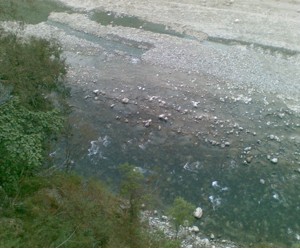/sub-categories/news-and-articles
News and Articles
Orissa, Bihar and Sikkim assess the damage done by floods and the earthquake - News Roundup (01 to 15 October 2011)
Posted on 12 Oct, 2011 02:13 AMThe work of repair and rehabilitation begins now. Assessments are being done of the assistance –and funds- needed in these two states.
Sikkim is beginning to assess the full extent of the damage caused by the 18th September earthquake. In addition to the loss of life, livelihoods have been severely impacted. The earthquake is also raising questions about the safety of the many dams planned on the Teesta.
Man-made floods in Orissa in September 2011- Key issues raised by Water Initiatives Orissa
Posted on 06 Oct, 2011 10:24 AMOrissa was hit by two spates of flood in September 2011, the first one being caused by heavy rains in the Mahanadi catchment and release of huge discharges from Hirakud dam. The second one was caused by heavy rains and flooding of Brahmani, Baitarani and Budhabalanga rivers. These floods point to the loopholes in river basin planning and management and calls for urgent attention of planners and policy makers.
Floods in Orissa wreck havoc and an earthquake in Sikkim leads to a trail of destruction - A comprehensive compilation of recent floods and disaster-related news articles
Posted on 01 Oct, 2011 10:04 AM A look at the news in the month of September 2011, indicates that the month has experienced a range of events such as heavy floods in different parts of the country with Orissa being the worst affected state, a major earthquake in the North East with Sikkim being the most affected, reports of flash floods and landslides in various parts of the country as well as reports of heavy rainfall in different parts of the country with indications that the rainfall may further subside in the coming week.
A look at the news in the month of September 2011, indicates that the month has experienced a range of events such as heavy floods in different parts of the country with Orissa being the worst affected state, a major earthquake in the North East with Sikkim being the most affected, reports of flash floods and landslides in various parts of the country as well as reports of heavy rainfall in different parts of the country with indications that the rainfall may further subside in the coming week.
Encroachers set fire to protected forest in catchment area and cultivating cash crops in Sirumalai hills
Posted on 29 Sep, 2011 02:28 PMAfter knowing that the encroachers set fire in the protected forest area, nearly 100 acres and cultivating cash crops in Sirumalai hills, iGREEN and Equal Justice jointly organised fact finding visit with lawyers and media persons and gone to sirumalai Hills. We were shocked when we saw fired forest land.
Different designs, same management: A note from Water Initiatives Odisha on Rengali dam and flood management
Posted on 28 Sep, 2011 09:57 AMWater Initiatives Odisha, brings out a special note on this issue in response to the latest spell of the flood disaster in northern Odisha Rivers.
Water conservation through better irrigation
Posted on 26 Sep, 2011 11:30 AMArticle and image courtesy: IndiaWaterReview

The agriculture sector in India, like elsewhere in the world, remains the largest consumer of water. As much as 80-85 per cent of India's available water resources are deployed annually in the agriculture sector, with industry being the second-most largest water consumer. But, contrary to the amount of efforts being put among industrial consumers to bring down their water consumption, agriculturists remain stuck on age-old methods and systems that lead to wastage of water.
So, while industry has been spending money on conducting in house research and development (R&D) to bring down their overall water consumption for making goods and products as well as deploying technologies that treat and reuse water and wastewater better, the agriculture sector has maintained status quo. Across India, farmers are still using flood irrigation methods for their crops. Most of them have not even head of drip irrigation or are so poor that they cannot afford to invest in drip irrigations systems.
Reap what you sow, eat what you grow A film by Suma Josson on urban community farms promoted by Urban Leaves in Mumbai
Posted on 24 Sep, 2011 06:21 PMReap what you sow, eat what you grow - A film by Suma Josson
It depicts how applying ecological principles and practices to maintain soil fertility, to manage crop health, and to keep soil and water in a good condition is especially relevant to the urban setting. The film focuses on the work being done in the urban farms, yet it can be seen as much more than that and, understood as a vision on healthy products, healthy production systems and as a way of life.
Goa, going, gone – A film by Carmen Miranda on Goa’s mining
Posted on 24 Sep, 2011 03:03 PMGoa, going, gone – A film by Carmen Miranda on Goa’s mining
As you may have assumed from its title, “Goa, going gone” is about Goa - - or more specifically, it’s about the environmental impact that is likely to result from the rampant mining that is underway in the state. Goa is being dug out of existence and gigantic craters expand across a 95 km long mining belt.
"The water in springs of my hills is cool, do not migrate from this land, o my beloved" - Solving water shortages through ancient knowledge
Posted on 24 Sep, 2011 12:33 AMAuthor: Anupam Mishra
"The water in springs of my hills is cool, Do not migrate from this land o my beloved.”